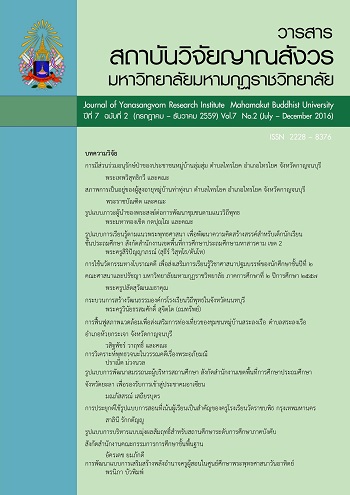RESULT BASED MANAGEMENT MODEL FOR BASIC EDUCATION INSTITUTIONS IN THE OFFICE OF THE BASIC EDUCATION COMMISION AKARADECH YOMPAKDEE
Main Article Content
Abstract
This research aimed (1) to study the administration condition used by the Result Based Management Model for Basic Education Institutions of compulsory education in The Office of the Basic Education Commission and (2) to develop the Result Based Management Model for compulsory education in The Office of the Basic Education Commission. The sample consisted of 364 samples. They came from a stratification random sampling. The instrument used was a questionnaire. The reliability by Cronbach's alpha coefficients was equal to 0.98 and the content validity of IOC was equal to 1. The results showed that: (1) The administration condition that used The Result Based Management Model for Basic Education Institution of compulsory education in The Office of the Basic Education Commission consisted of seven conditions: (1) the designation of the analysis, vision and mission, (2) the designation of the main determining factor of success and indicators of operating, (3) the designation of the target, (4) the designation of the source and data collection, (5) The designation of planning and implementation of the strategic plan, (6) the designation of analysis and evaluation, (7) the designation of the review and achievement report. Educational Institution administrators have the level of compulsory education in both overview level ( =4.37) and conditions. (2) Result Based Management Model for The Basic Education Institution of compulsory education in The Office of the Basic Education Commission that the researcher developed included the designation of the analysis, vision and mission, the designation of the main determining factors of success and indicators of operating, the designation of the target, the designation of the source and data collection, the designation of planning and implementation of the strategic plan, the designation of analysis and evaluation, and the designation of the review and achievement report. The results of the confirmatory factor analysis showed that the level of harmony between models with empirical data on the Chi - Square at 10.29 (p = 0.327). The degree of freedom 9 index level of harmony (GFI) was 0.99. The harmonized index (GFI) was 0.99. The index measured the proper fit and adjusted (AGFI) index of 0.97. The index square root of the mean deviation estimated. (RMSEA) was 0.021. It is concluded that the model to measure the components of the confirmed Result Based Management Model for Basic Education Institution of compulsory education (RBM) was consistent with empirical data.
Article Details
References
กิตติ บุญนาค.(2549).ยุทธศาสตร์การบริหารการพัฒนาองค์การสมัยใหม่ โดยการใช้กระบวนการบริหารแบบมุ่งผลสัมฤทธิ์ (Results Based Management: RBM). กรุงเทพฯ.
ทิพวรรณ หล่อสุวรรณ.(2543).ทฤษฏีองค์การสมัยใหม่:Modern Organization Theory.กรุงเทพฯ: บริษัทแซทโฟร์ พริ้นติ้งจำกัด.
ทิพาวดี เมฆสวรรค์. (2543). การบริหารมุ่งผลสัมฤทธิ์. กรุงเทพฯ: สำนักงานคณะกรรมการข้าราชการพลเรือน, อัดสำเนา.
ปิยะชัย จันทรวงศ์ไพศาล.(2554). Results Based Management :RBM การบริหารมุ่งผลสัมฤทธิ์. กรุงเทพฯ: บริษัทเอช อาร์ เซ็นเตอร์ จำกัด.
พูลสุข หิงคานนท์ (2549) . ทฤษฎีที่เกี่ยวกับการบริหารระบบบริการพยาบาล ในคณะกรรมการผลิตและบริหารชุดวิชา การพัฒนาศักยภาพระบบบริการพยาบาล หน่วยที่3,13. นนทบุรี: มหาวิทยาลัยสุโขทัยธรรมาธิราช.
สถาบันส่งเสริมการสอนวิทยาศาสตร์และเทคโนโลยี.2555.ผลการประเมิน PISA 2009 การอ่าน คณิตศาสตร์และวิทยาศาสตร์ บทสรุปเพื่อการบริหาร.สมุทรปราการ :แอดวาสซ์ พริ้นติ่งเซอร์วิส.
สำนักปลัดกระทรวงศึกษาธิการ.(2554). สถิติการศึกษาฉบับย่อ. กรุงเทพฯ: ศูนย์เทคโนโลยีสารสนเทศและการสื่อสาร.
สำนักงานคณะกรรมการกฤษฎีกา.(2545). พระราชบัญญัติระเบียบบริหารราชการแผ่นดิน(ฉบับที่ 5) พ.ศ. 2545 (2545,2 ตุลาคม),ราชกิจจานุเบกษา,เล่ม 119( ตอนที่ 99 ก), หน้า 2
สำนักงานคณะกรรมการข้าราชการการพลเรือน.(2545).คู่มือการพัฒนาระบบบริหารมุ่งผลสัมฤทธิ์. กรุงเทพฯ:สวัสดิการสำนักงาน ก.พ.
สุพจน์ บุญวิเศษ.(2549).การบริหารมุ่งผลสัมฤทธิ์ (Results Based Management) กับการประเมินผลการปฏิบัติงานในระบบราชการและเอกชน.วารสารวิชาการมนุษย์ศาสตร์และสังคมศาสตร์ มหาวิทยาลัยบูรพา,1-18.
สุพจน์ ทรายแก้ว. (2543). การวัดผลการปฏิบัติงาน. เอกสารประกอบการสัมมนาเชิงปฏิบัติการจัดทำแผนกลยุทธ์. สถาบันราชภัฏเชียงราย,เอกสารอัดสำเนา.
ดามพ์ กันแก้ว.(2547). การบริหารจัดการใช้เทคโนโลยีทางการศึกษาในโรงเรียนขยายโอกาสทางการศึกษา สังกัด สำนักงานเขตพื้นที่การศึกษาน่าน เขต 1. วิทยานิพนธ์ครุศาสตร์บัณฑิต,สาขาการบริหารการศึกษา,สถาบันราชภัฏอุตรดิตถ์.
สำนักงานคณะกรรมการพัฒนาระบบราชการ .บทบาทของธนาคารโลกในการพัฒนาระบบราชการ The Role of World Bank และมุมมองในระดับสากลเกี่ยวกับการบริหารแบบมุ่งผลสัมฤทธิ์. แหล่งที่มา. htt://www.opdc’go’th/content.php?menu_id=5&content_id=1446. วันที่สืบค้น 26 มกราคม พ.ศ. 2552.
Locke, E. A., and LaTham, G. P. (2004). What Should We Do about Motivation Theory. Recommendations for the Twenty-First Century. Acadamy of Management Review, 29, 388 - 403.
Kusek, Jody Z., and Rist, R. C. 2004). Ten-Steps to a Result-based Monitoring and Evaluation System. Washington D.C.: The World Bank.
UNAID.2003.The Performance Management Toolkit: A Guide to Development and Implementing Performance Management Plans. Policy and Program Coordination Bureau ,Washington ,DC.
UNPD.The Evaluation of Results Based Management at UNDP. Evaluation Office ,New York,NY,December2007
Anna-Luis Cook.(2004). Managing for Outcome” in the New Zealand Public Management System. The Master degree from Victoria University of Wellington.


